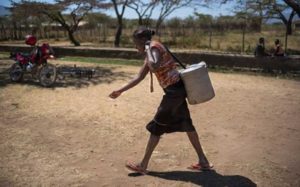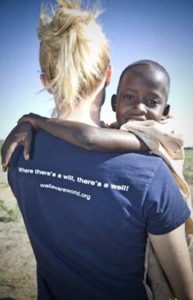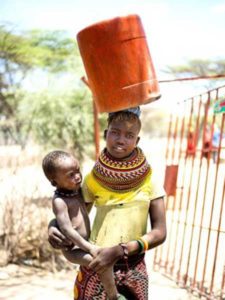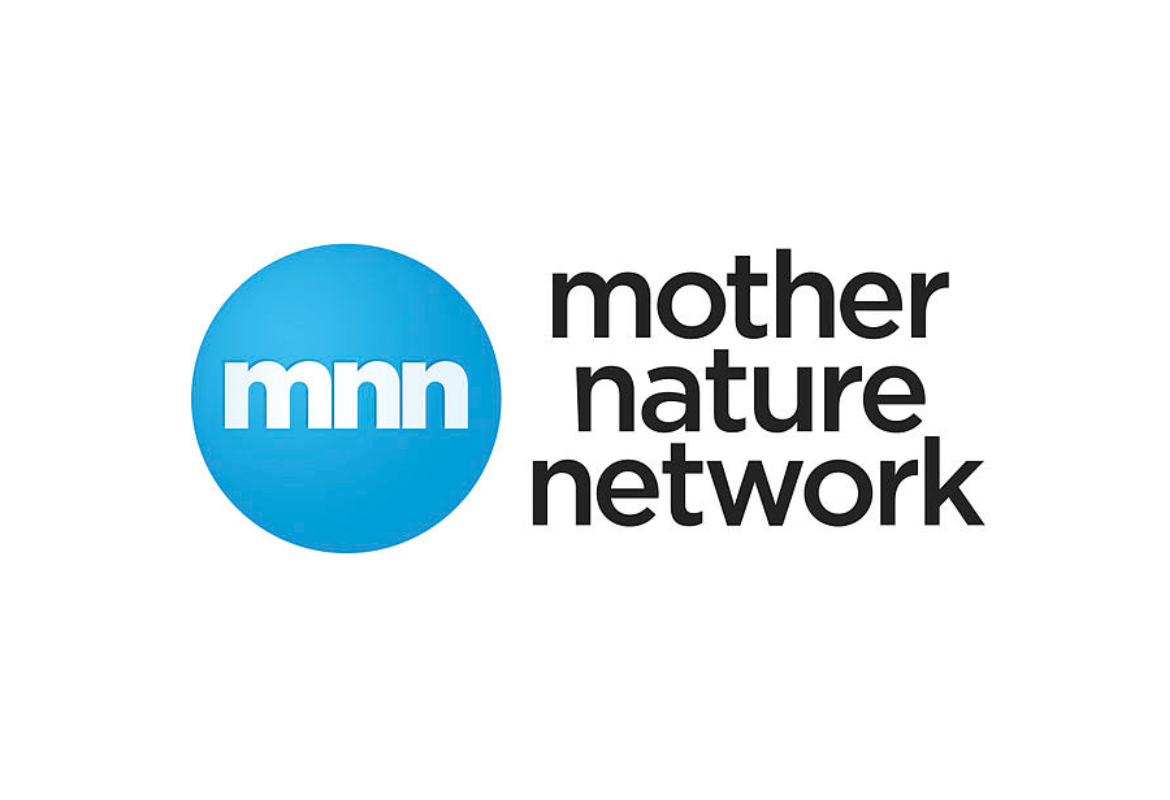Well Aware’s founder, Sarah Evans, didn’t just wake up one day and decide to start an international water nonprofit. Well Aware — which, to date, has transformed the lives of more than a quarter-million people across 61 communities in Kenya and Tanzania — actually started in a much more modest, simple way. A Kenyan friend had approached Sarah to support a fundraiser she was doing for her father, who was a Massai tribesman in Kenya. All of the family’s livestock- the goats and cattle they depended on for their livelihood had died, and Sarah’s friend was fundraising to help buy more for her family.
Most friendships (and fundraisers) begin and end right there: one friend asks for help, another friend gives it. But Sarah Evans proved to be a different kind of friend. She wanted to help, of course, but she also wanted to understand the deeper issue.
“But, why are the livestock dying?” she asked. This one simple question would end up changing her life, and, as it would turn out, the lives of many others, too.
Sarah found out that the livestock was dying due to lack of clean water in the area, and the whole community was suffering, too. Unfortunately, her friend’s family and community were part of the global statistic of the nearly 1 billion people who lack access to clean water.
The statistics around clean water, or lack thereof, are compelling:
- 1 in 10 people, nearly 1 billion in total, lack access to clean water (WHO)
- Every 90 seconds, a child dies from preventable waterborne disease (WHO)
- Women and girls in developing countries walk 3.7 miles on average each day to collect water
- Many girls drop out of school during puberty due to lack of a place to wash
 But, the difference in access to clean water can make is equally astounding:
But, the difference in access to clean water can make is equally astounding:
- Disease rates plummet 64 percent*
- Education rates increase 34 percent overall, and education rates for girls, specifically, increase by 54 percent*
- A 15-minute reduction in water collection time increases the proportion of girls attending school by 8-12 percent
- For every extra year a girl goes to school, her income goes up by 12 percent
- Reducing water collection time boosts women’s economic activity, improving gender equality and overall community livelihood
(*Data from Well Aware’s impact measurement evaluations conducted after a clean water system is implemented)
 After digging deeper, Sarah realized that water, not the livestock, was the core issue that needed to be addressed in this community and that clean water had the potential to transform the community forever. So, she helped pivot her friend’s project from being a fundraiser to replace livestock to a fundraiser to drill a water well. (That’s Sarah at right, shown at her first drill with a young villager named Joy in her arms.)
After digging deeper, Sarah realized that water, not the livestock, was the core issue that needed to be addressed in this community and that clean water had the potential to transform the community forever. So, she helped pivot her friend’s project from being a fundraiser to replace livestock to a fundraiser to drill a water well. (That’s Sarah at right, shown at her first drill with a young villager named Joy in her arms.)
Having the idea of a water well is one thing. Raising enough money for it is something else entirely. Sitting around one summer day, Sarah and a group of friends were brainstorming ideas about how to raise money for the well. It was August, in Texas, which means it was HOT. One friend threw out, “Why don’t we just tell people we won’t shower until they give us money?”
It was a crazy idea, but then again, they were a crazy group of friends. And, as Steve Jobs once said, “the people who are crazy enough to think that they can change the world, are the ones who do.”
So, it was official: They would go on Shower Strike and vow not to take a shower until they had raised enough money for a water system. In just one week, the group of (very stinky) friends raised $25,000 — enough to cover the costs of drilling a well for that community.
Sarah’s first trip to Kenya to oversee that first drill would change her life. But more importantly, it would begin to change an industry. What Sarah didn’t realize at the time (and what most people don’t realize) is that there’s not just one global water crisis, but two:
- Many people know that nearly a billion people lack access to clean water
- Most don’t know, however, that 60 percent of water systems fail within the first year
 This means roughly $103 million in failed aid each year, and that’s just from the top three U.S. charities. It also means incredible devastation for communities where water systems have failed.
This means roughly $103 million in failed aid each year, and that’s just from the top three U.S. charities. It also means incredible devastation for communities where water systems have failed.
So, after the success of the first water system, Sarah and Well Aware set out to understand why the water charity industry was broken. Well Aware funded its own study of 200 broken and abandoned wells in Kenya, and found that most of them failed for one of two reasons: lack of technical oversight and lack of community involvement.
These insights have shaped Well Aware. Where the water charity industry has often been guilty of a “dig and ditch” model of drilling and abandoning, Well Aware has focused on long-term, sustainable impact by working with communities, operating with transparency, and committing to innovate and evolve.
In doing so, Well Aware has begun to transform the industry. Since that first water system in 2010, Well Aware has completed 61 projects and impacted the lives of a quarter-million people, all while maintaining a 100 percent success rate. This means that each and every project is still functioning and providing clean water to the communities. Additionally, each water system creates its own ripple effect in the community: disease rates go down, education rates increase, agriculture and commerce grow, and gender equality improves. Finally, economic prosperity, peace, stability and growth occur.
And, it all started from that one question — “But, why are the livestock dying?” — and a small group of friends who wanted to make a real impact.
That crazy Shower Strike idea turns 11 years old this year and has become an annual, worldwide tradition. Through the years, hundreds of people have decided they want to make a difference in the water crisis by participating in the Shower Strike campaign. Together, they have raised enough money to bring clean water to more than 124,000 since Shower Strike’s inception.
This year, will you be one of them?
